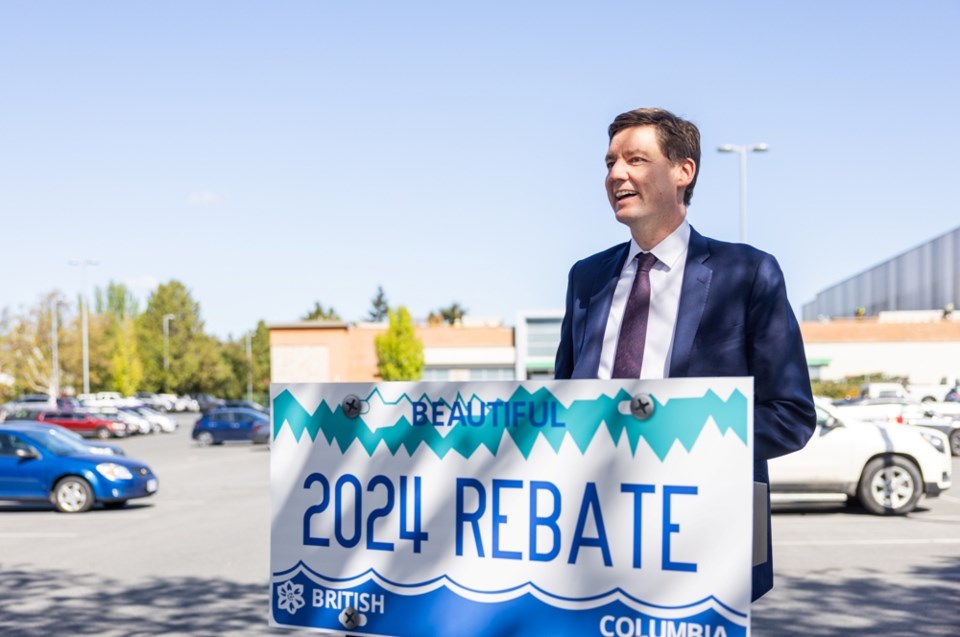The ICBC basic rate will remain the same for a sixth year and rebates of $110 will be sent to all eligible customers starting later this month, Premier David Eby said Wednesday.
The freeze on basic rates will be in place until March 31, 2026, although premiums are adjusted for at-fault crashes, number of claims, years of driving experience, geographic location and type of vehicle.
The last increase to basic insurance, which is mandatory on every registered vehicle in B.C., was in 2019.
Eby, who made the announcement outside Hillside Shopping Centre in Victoria, where there is an ICBC outlet, attributed the rate freeze to seven years of work getting the public auto insurer “back in the black.”
After it took over from the then BC Liberals in 2017, the NDP government called the corporation a “financial dumpster fire,” as it faced $1.3 billion in losses.
“We had a monopoly insurer in our province that was losing a billion dollars a year,” said Eby. “The money that was in ICBC’s account was raided by government to artificially prop up government budgets, instead of being left where it belonged, with the insurer to ensure that drivers who were in accidents were protected.”
ICBC, which was in a deficit in 2019-2020, is now projecting net investment income of roughly $1.5 billion for the fiscal year 2023-2024. The final audited net income figure will be published in late summer.
Starting late this month, a $110 rebate will go to everyone who had an active eligible basic insurance policy in February 2024. Those with insurance on two vehicles will receive rebates for both, as the rebate applies to each policy.
The only customers who won’t see rebates are those with average annual premiums of less than $250, typically for golf carts, utility vehicles and temporary operating permits and storage policies.
A total of $400 million will go toward rebates on about 3.6 million policies, bringing spending on four rebates to date to $503 per policy holder, for a total of $1.75 billion.
Despite no increase to the basic rate over six years and four rebates, “ICBC continues to be in strong financial standing,” said Eby, in response to suggestions the perks pre-election handouts or one-time investment windfalls.
On average, drivers have saved $2,000 in rebates and lower rates, said Eby, who credited the government’s “enhanced care” model — also called no-fault insurance — significant work from the public service, and prudent management by ICBC resulting in annual increases in the corporation’s capital reserves as well as positive investment returns.
“It’s not a massive rebate, but it is one less worry for British Columbians,” said Eby. “It’s a little bit of money and it’s a consistent rate that in a time of rising prices is something that they can count on.”
Public Safety Minister and Solicitor General Mike Farnworth said ICBC is able to return $400 million to drivers in part due to a commitment in law that ICBC’s surplus should go toward drivers instead of general government coffers.
The rebate, along with the basic-rate freeze, underscores the benefits of a public auto insurer, Farnworth said.
BC United Leader Kevin Falcon, in a media availability, suggested the rebate is an attempt by a government that’s “in a lot of trouble here in the legislature” to distract the public from issues such as decriminalization, adding it fails to compensate motorists for the cost of the carbon tax increase on April 1.
“And now they’re trying to say here, we’re going to give you back a $100 rebate, mere weeks after increasing the carbon tax by 23 per cent,” said Falcon. “I don’t think anyone’s fooled by the duplicity.”
Eby said B.C. Conservative Leader John Rustad and Falcon — both of whom served in the BC Liberal Party, which governed the province from 2001 to 2017 — “will have to accept that they drove our public insurer into the ditch.”
B.C. Greens Leader Sonia Furstenau said one-time rebates don’t solve “systemic problems.” “Many British Columbians are struggling with affordability, which is why we have called for investment in affordable transit,” Furstenau said in a statement. “People who cannot afford a car deserve a break, too.”
Processing the rebates will cost $4 million, the province said.
For those who paid by credit card, the refund will be applied to that card, Autoplan customers will see the rebate applied to their next payment, while customers who use debit, cash or cheque will receive a rebate cheque unless they sign up for direct deposit by May 21 through their Autoplan broker or via ICBC’s website, which will direct the rebate directly into their bank account.
David Wong, ICBC’s new president and CEO, said customers who want to receive rebates as quickly as possible should update their addresses and sign up for direct deposit.
Initial rebate payments will begin in late May, with ongoing processing until the end of July, he said.
Customers receiving rebates via cheque are advised to allow additional time for mail processing and delivery.
^
To learn more about ICBC, visit: https://icbc.com/2024rebate




